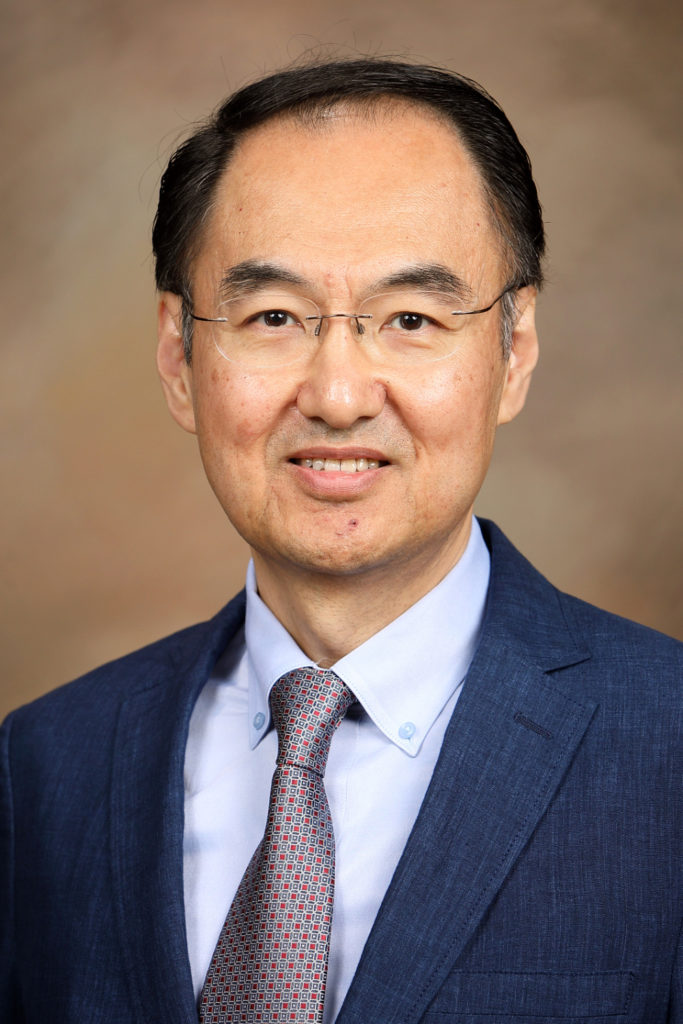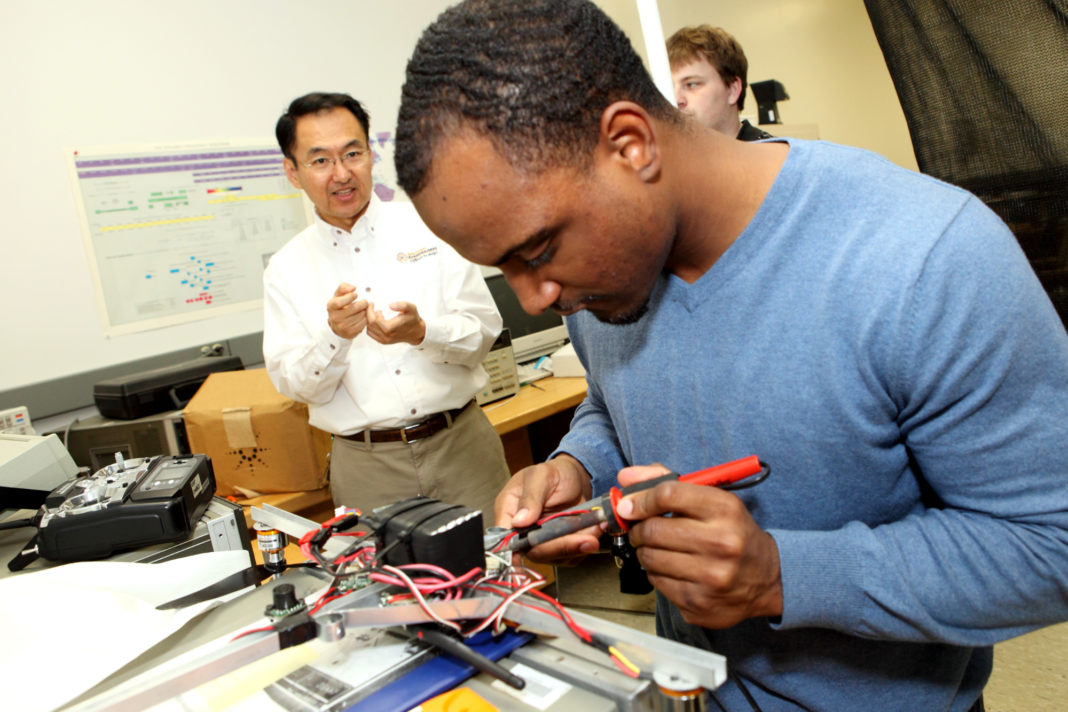MACON – Mercer University School of Engineering faculty member Dr. Anthony Choi developed one of four projects nationwide awarded a total of $4 million by NASA through its new Space Grant K-12 Inclusiveness and Diversity in STEM (SG KIDS) program.
The project, titled “Inspiring NASA’s Next Generation through Building, Coding, and Machine Learning Missions (NASA ML-Bots),” received one of the program’s four inaugural million-dollar grants aimed at bringing the excitement of authentic NASA experiences to groups of middle and high school students who are traditionally underserved and underrepresented in STEM.

Dr. Choi, professor of electrical and computer engineering and director of Mercer’s Machine Intelligence and Robotics Laboratory, and Dr. Steven Ruffin, director of the Georgia Space Grant Consortium housed at Georgia Institute of Technology, serve as co-principal investigators on the project.
“As machine learning and artificial intelligence (ML/AI) grow in impact and importance, I saw an urgent need to address future needs. We, as a nation, were late to introduce computer programming in K-12 in the early years as computer programming grew in importance. I didn’t want us to make the same mistake with ML/AI,” said Dr. Choi. “I developed this project concept to deliver grade-appropriate ML/AI concepts and skills by leveraging powerful online computing resources that students can access via a web browser and the amazing open-source resources available on Git code repositories. My aim is to provide curriculum that will remove barriers such as intimidating subject matter and inaccessibility of powerful computing hardware.
“NASA ML-Bots aims to increase access to opportunities for underrepresented and underserved students in the high-demand and high-paying ML/AI fields that are critical to NASA’s future autonomous systems and the modern STEM workforce. The prototype curriculum will be developed and tested at Mercer by my students and me, and our curriculum will be disseminated throughout the Southeast through NASA Space Grant consortium partners in the region.”
Additional collaborators include Alabama Space Grant Consortium, LaSTEM (an affiliate of the Louisiana Space Grant Consortium), the University of Tennessee Chattanooga (an affiliate of the Tennessee Space Grant Consortium), Morehouse College and the Atlanta University Center, and the Hines Family Foundation.
The project will deploy NASA ML-Bots to teach the fundamentals of coding, artificial intelligence and machine learning to middle and high school students in Georgia, Alabama, Louisiana and Tennessee, providing students firsthand experience in machine learning and artificial intelligence as they design and operate a robotic rover through an obstacle course.
“Creating a sustainable and diverse workforce pipeline in the area of ML/AI for robotic systems is necessary to achieving NASA’s future exploration goals for the moon, Mars and beyond,” said Dr. Ruffin. “The curriculum and collaboration established by this NASA support will have lasting impact in K-12 educator capabilities and student skills for years to come.”
Mercer will lead in development of project curriculum, while Georgia Space Grant Consortium will manage coordination and distribution of curriculum throughout the Southeast. Additional partners will be involved in the implementation and training of the curriculum in their respective areas.
SG KIDS is a pilot program made possible through NASA’s National Space Grant and Fellowship Project, which comprises Space Grant Consortia led by an institution in each of the 50 states, the District of Columbia and Puerto Rico. This opportunity represents a new approach by asking the awarded consortia to reach beyond state boundaries to create regional projects tailored to students in those areas.
“Through Space Grant KIDS, we’ve asked the nation’s Space Grant consortia to deploy educational activities across state lines to share the excitement of NASA and STEM with students who otherwise might not have that opportunity,” said Mike Kincaid, NASA’s associate administrator for the Office of STEM Engagement, which administers NASA Space Grant. “We’re looking forward to seeing how these regional partnerships will make a lasting difference for the Artemis Generation.”
Each of the four grantees – Virginia Space Grant Consortium, Georgia Space Grant Consortium, Ohio Space Grant Consortium and Texas Space Grant Consortium – receive approximately $1,050,000 in cooperative agreements to put their proposals into action during the next three years.
Dr. Choi received an additional $20,000 from NASA through the Georgia Space Grant Consortium for two 2022-2023 academic year programs, titled “Development of Autonomous Unmanned Vehicles as Platforms for Innovative Research” and “Open Robotics Laboratory for Undergraduate and Graduate Students.”
“These grants make a huge impact for Mercer students by creating an open-access tinker and prototyping space and funding smaller robotics projects,” said Dr. Choi. “The laboratory is open to any student with interests in robotics or intelligent systems. Students can walk into the lab and start on predefined small projects, larger projects with other members, research projects led by senior undergraduate or graduate students, or their own projects. This creates an environment for students to get hands-on experience with formal and informal support systems. Students can experience, experiment and design with minimal cost and almost no delay in obtaining parts. The lab is stocked with not only major equipment, but also sensors, actuators, rapid prototyping capabilities and more. The Open Robotics Laboratory provides a vibrant and conducive environment where students can let their interests and imaginations run wild.”
Dr. Choi earned his B.S. in electrical engineering from George Washington University and his M.S. and Ph.D. in electrical engineering the from University of Florida.
His primary research interests include machine learning, artificial intelligence, expert systems, big data analytics, data visualization, unmanned systems, robotics, intelligent systems and acoustic localization.
He has conducted previous research funded by NASA, the National Science Foundation and the Office of Naval Research in machine learning, unmanned systems, data analytics, neural networks, smart devices and artificial intelligence.
About the School of Engineering
Mercer University’s School of Engineering, founded in 1985, offers innovative and academically challenging programs that provide students with a comprehensive education, featuring a solid foundation in mathematics and sciences, a core engineering curriculum, a range of courses in engineering specialties and a strong emphasis on communication technologies. The School is consistently ranked by U.S. News & World Report as one of the top three master’s-degree-level engineering schools in the Southeast. Known for its breadth of instruction in its undergraduate program and its five-year joint bachelor’s and master’s degree program, the School combines technical education with hands-on laboratory experience. Mercer engineers can look forward to joining fellow alumni in companies such as Robins Air Force Base, Mercer Engineering Research Center, Northrop Grumman, Georgia Power, Manhattan Associates and Gulfstream Aerospace.









